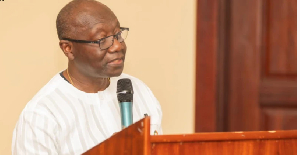Ghana’s Public Interest and Accountability Committee (PIAC) a body which monitors the use of petroleum revenues continues to grapple with office accommodation as it has no permanent office of its own.
The Committee has since its establishment been facing threats of ejection due to delayed payment of rent, a situation which has been impacting negatively on its work.
The Petroleum Revenue Management Act (PRMA, Act 815) gave PIAC the authority to provide independent assessment of the management and use of petroleum revenues.
PIAC, it will be recalled was ejected from its offices in 2014 due to failure to honour its rental obligations.
Business Finder’s sources at the Committee’s Secretariat say government coughs between GH¢58,000 and GH¢60,000 a year to settle rent.
Besides government’s budgetary support to PIAC, the Committee is heavily reliant on donor support, particularly, the Department for International Development (DfID), German development agency (GIZ) and the Natural Resource Governance Institute (NRGI).
Since its establishment about five years ago, the Committee has made startling findings in its reports over the misuse of oil revenues as well as discrepancies in reporting of revenue figures from the Ministry of Finance and other relevant institutions.
For instance PIAC in its 2014 report revealed financial irregularities at the state oil corporation, the Ghana National Petroleum Corporation (GNPC). The Committee’s findings were corroborated by the 2014 Auditor-General’s Report.
According to PIAC, the GNPC had in 2013 advanced US$50million to the Ministry of Finance, an amount which was expected to be repaid in three months but remains unpaid. The said amount, the Committee said was expected to be used to fund components of the Western Corridor Gas Infrastructure Development Project.
Head of Policy Unit at Africa Centre for Energy Policy (ACEP), Dr Ishmael Ackah is worried about the predicament of PIAC as he points out that “if the financial bottlenecks are not speedily resolved, the 2015 report which the Committee has been working on may come in 2018 by which time most of the findings would be outdated.”
The committee, he observed happens to be the only body that checks government’s spending of oil revenues, insists on transparency and accountability.
“If government says am going to fund this number of projects who checks whether monies allocated for those projects really were applied as intended?” he wondered.
Dr Ackah bemoaned the delay in the release of funds allocated to the Committee from the National budget. According to him, “there are no timelines as to when PIAC’s allocation should go so most of the times while other oil projects receive their allocations on quarterly basis, allocation to PIAC is received late and so the Committee is unable to do its work appropriately and so their reports get delayed unduly.”
He took issue with some provisions in the PRMA 815 which prior to its amendment had empowered the Minister of Finance to approve the budget of PIAC.
“The person you are supposed to monitor is to approve your budget so if your budget must be approved you don’t say things that will go against him; “he noted.
According to him, even though the Act had been amended and the Minister’s discretionary approval removed “the sub section 2 says the Minister will approve PIAC’s allowances, meaning the allowances of the commissioners working at the Committee’s Secretariat must be approved by the Minister.”
Business News of Thursday, 26 May 2016
Source: thefinderonline.com













